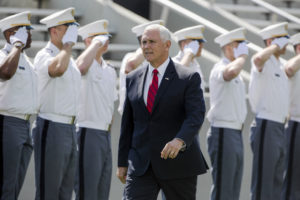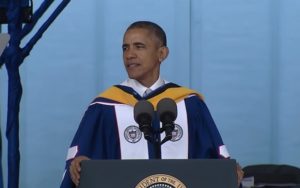At World’s End and Back Again
On this sun-dappled afternoon, class of 2013, I want to make a suggestion. Take out your iPhone. Text a friend at a graduation ceremony elsewhere. Chat with your relatives. Amuse yourself. In the meantime, let me address a group with far less time than you, but perhaps a longer attention span at this particular moment -- my own cohort.
By Tom Engelhardt, TomDispatchThis piece first appeared at TomDispatch.
Here may be the most commonplace sentence anyone could write about graduation day in any year: when I think back to my own graduation in 1966, an eon, a lifetime, a world ago, I have no memory of who addressed us. None. I have a little packet of photos of the event: shots of my parents and me, my grandmother and me, my aunt and me, my former roommates and me, my friends and me. You can even see the chairs for the ceremony. But not the speaker. And yet it’s odds on that he — and in 1966, it was surely a “he” — made some effort to usher me into the American world, offering me, as a member of a new generation, words of wisdom and some advice. You know, the usual thing that no one pays much attention to or ever remembers.
Here, on the other hand, is my most vivid memory of that day. I reserved a room at a local motel for my parents the night before the graduation ceremony. As it happened, I had reserved the same room the previous night for my girlfriend and me (and conveniently not paid for it). When, on the morning of graduation, I picked my parents up and my father went to pay, the hotel clerk charged him for both nights, winked, and said something suggestive.
It was, believe me, a humiliatingly uncomfortable moment. Despite what you’ve heard about the 1960s, this wasn’t acceptable behavior. I wonder what was in my mind then? Was I really incapable at the time of thinking 24 hours ahead? Or was I simply out to rile my parents up? At this distance, who knows? I may not even have known then, since our motivations tend to be far more mysterious, even to us, than we like to think.
In any case, on this sun-dappled afternoon 47 years later, standing here before you, the class of 2013, I have little doubt that not much has changed when it comes to graduations. As your last experience here, your final moment, you’ve been guaranteed the same regurgitation of “wisdom,” passed on from those who supposedly know to those who supposedly don’t. So, as the novelist Kurt Vonnegut might once have said, it goes. Or every now and then, it doesn’t.
I could certainly tell you what a mess this world of ours is in. It’s my stock in trade at the website I run, TomDispatch.com, and from wars to eco-catastrophe, this is the country and the planet that just keeps on giving when it comes to a publication like mine. But I already know that, like me all those years ago, you won’t remember what I say. You’ll have your equivalent of that motel room, something more immediate on your mind. So let me make a suggestion. Take out your iPhone. Text a friend at a graduation ceremony elsewhere. Chat with your relatives. Shoot video of your classmates. Check out your favorite websites. If you’re a pioneer with access, put on those Google glasses. Amuse yourself.
Graduating the Class of 1966
In the meantime, let me address a group with far less time than you, but perhaps a longer attention span at this particular moment. I’m talking about your grandparents sitting here with you today. Or to make things simpler, let me just speak directly to my own cohort.
Class of 1966, it’s my feeling that all of us post-post-docs of life need a graduation speech that will usher us back into our world for one last round of action and activity. After all, we have two obvious things going for us. We’re living longer, so no one should write us off quite yet and we’re the generation for whom, briefly, the American world seemed to split open back in the late 1960s and early 1970s. Among other things, we saw into a certain heart of imperial darkness in those Vietnam years, so that nothing after, not Abu Ghraib, nor CIA torture, nor drone assassinations, nothing could truly be news to us when it came to the American way of war.
But we saw something else, too. We saw possibility. We had the example of the Civil Rights movement just behind us. We saw what “the people” could do. We saw that everything did not have to remain as it was, as it had always been. We saw that language could change, which meant that it was possible to think about and describe our American world in new ways. This was no small thing, even if, in truth, that moment didn’t last terribly long or end particularly well. After all, from the rubble of “the sixties,” the only obvious “revolution” that arrived was the right-wing one, ushering in the Age of Reagan. Still, we saw what we saw.
It’s common enough in graduation addresses for a speaker to say that his generation’s moment is over and to pass the “baton” to the next one, to insist in this case that the class of 1966 is history, and that the class of 2013 has arrived and should seize its main chance now. These days, it would be easy enough to put a nasty twist on that sentiment and tell our children and grandchildren, you, the graduates of 2013, that we failed you, that we left the world in worse shape, and that now — thank you very much — we’re dumping it into your laps to deal with. Good luck and godspeed!
And in some sense, any sane person who surveyed our American world today would have to agree with that: the congressional system is busted; a president nobody in Washington pays much attention to resides in a White House which has garnered so much power that he can commit more or less any kind of mayhem he wants outside our borders; our wars are endless, destructive to others and treasury-draining to us; our infrastructure is rotting away; the kind of entrenched poverty we have now would have made Lyndon Baines Johnson blush; inequality is growing by leaps and bounds; the rich only get richer; big money and dark money have our politics by the throat and “democracy” has largely become the name for a new form of nonstop campaign season TV punditry and entertainment; fossil fuels have been proclaimed the American future and are being hailed as such, even though getting them all out of the ground will fry our world; “extreme weather,” neutered of its possible climate-change significance, makes for constant dramatic news ledes and so we’re pointlessly regaled with disconnected tales of particularly stunning storms, tornados, floods, heat, cold, drought, and so on; and that’s just to begin a list that could be (but won’t be) the rest of this speech. If you wanted to offer an epitaph for our world, the sort of thing you might etch on our collective tombstone, you could do worse than quote the rhetorical question Rex Tillerson, CEO of ExxonMobil, asked his company’s shareholders recently: “What good is it to save the planet if humanity suffers?”
What good indeed? Back in the 1960s, pre-Tillerson and pre-climate change, we had one lucky thing going for us which you, the class of 2013, don’t and won’t have going for you: the illusion that we couldn’t and wouldn’t destroy our own planet. Of course, my generation — I was born in 1944 — grew up in a distinctly exterminationist world.
We were the first generation of the Atomic Age, and going to school meant following the advice of Bert the Turtle and ducking under your desk when the test sirens went off, part of our training for what to do if, in the Cold War stand-off of that time, Hiroshima became us. Despite the wealth and seeming triumphalism of that American moment, there was a grim undercurrent of doom, too. I can still remember the repetitive dreams I had in my teens in which I would find myself at world’s end with the Bomb (which we tended to capitalize) going off, the mushroom cloud rising, the intense heat searing my arms, before waking with relief.
But in the early 1960s, after the Cuban Missile Crisis ended, the first “arms control” treaty sent atomic testing underground, and the last round of atomic films and fantasies left the scene, it became easier to imagine, however briefly, that the world had somehow been rid of the possibility of human destruction. You could begin to forget — that is, ignore — the Bomb. Though seldom credited with having anything to do with “the sixties,” I suspect that this illusion, for that was all it was, felt like a reprieve from a sentence of doom. It acted like a kind of unexamined liberation, leaving us free in some strange way to plunge into our American world, eyes open, filled with energy and the desire to do something, to transform the world for the better.
Heading for the Entrances
That moment is long gone. Now, the exterminationist grid that envelops us, that envelops you, class of 2013, whether you’re fully conscious of it or not, has only grown stronger and more imprisoning. I know that many of you can imagine an immediate future for yourselves. It must be harder, though, to imagine the sort of future — one to be built for your children and grandchildren — that almost has to be the basis for any oppositional movement that hopes to truly change our world.
Perhaps this is what my cohorts and I from the class of 1966 can still offer you. A memory of what a future without bounds, without a sense of impending doom, felt like. And as for you, my former classmates, I just want to remind you that we’re still here, we’re not dead yet. How can we hand this mess of a world over to the young this way without trying one more time ourselves? Isn’t that a debt we owe? Shouldn’t we, as we used to say, “tell it like it is,” which means telling everyone, ourselves included, that it can still be different, that it’s never too late?
There’s no point in trying to deny it: we live at a daunting moment and in the heart of an empire, a power (as the neocons used to assure us) the likes of which hasn’t been seen on planet Earth, ever. This can be discouraging. I sometimes wonder what it was like for critics living inside, say, the Roman Empire (or its Chinese equivalent) while its power was still stunning, even if in decline.
In addition, the issues, especially the inability of this country to face the way it’s feeding climate change — that is, the devastation of the world of the class of 2013 and that of your children — can be overwhelming.
How to start? Where to start? Why even try?
And yet, maybe in that very sense of being overwhelmed is a place to begin. In the 1960s, the issues at stake seemed far more separate, more distinct. The nuclear issue, the Vietnam War, civil rights, women’s rights, the environment, and so on. You could get involved in any one and not end up dealing with the others. These days, all issues increasingly seem to lead to the same planetary crisis: the wars, the 1% societies, the too-big-to-fail financial institutions, climate change. Aren’t they beginning to blend into a single, all-encompassing crisis? Which means: start in anywhere and sooner or later you’ll find yourself heading for the heart of the thing. It may really hardly matter where you begin.
The answer, class of 1966, is: just begin. Just believe that for every measure, there is still a potential countermeasure. That you matter. That we matter. That we’re not too old. That it’s not too late. That it truly isn’t right, even now, to leave all this to our children. That the future by definition isn’t and can never be known, which means it’s no more Rex Tillerson’s than it’s ours.
So, class of 1966, potential graduates of life-thus-far, prepare yourselves. You may not move as fast as you once did, but that’s okay. When you’re ready, just head for the entrances, not the exits. It’s time to begin.
Tom Engelhardt, co-founder of the American Empire Project and author of The United States of Fear as well as a history of the Cold War, The End of Victory Culture (just published in a Kindle edition), runs the Nation Institute’s TomDispatch.com. His latest book, co-authored with Nick Turse, is Terminator Planet: The First History of Drone Warfare, 2001-2050.
[Note for Readers: Just to be completely clear, I was invited to no campus to give this commencement speech. I gave it on the campus of my mind, and nowhere else. In addition, I’d like to offer a deep bow of thanks to my friend and mind-meld-mate John Cobb for sparking this address in the first place.]
Follow TomDispatch on Twitter and join us on Facebook or Tumblr. Check out the newest Dispatch book, Nick Turse’s The Changing Face of Empire: Special Ops, Drones, Proxy Fighters, Secret Bases, and Cyberwarfare.
Copyright 2013 Tom Engelhardt
Your support matters…Independent journalism is under threat and overshadowed by heavily funded mainstream media.
You can help level the playing field. Become a member.
Your tax-deductible contribution keeps us digging beneath the headlines to give you thought-provoking, investigative reporting and analysis that unearths what's really happening- without compromise.
Give today to support our courageous, independent journalists.





You need to be a supporter to comment.
There are currently no responses to this article.
Be the first to respond.